|
|
|
Sort Order |
|
|
|
Items / Page
|
|
|
|
|
|
|
| Srl | Item |
| 1 |
ID:
084992
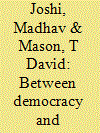

|
|
|
|
|
| Publication |
2008.
|
| Summary/Abstract |
The Maoist insurgency in Nepal presents an anomaly for students of civil war and democratic transitions. How was the Maoist wing of the Nepal Communist Party able to mobilize peasants to support their insurgency when they could not mobilize enough peasants to vote for them in elections? The authors address these questions by exploring the ways in which the persistence of traditional clientelist networks in the countryside enabled rural elites to mobilize peasants to vote for parties other than the Maoist party, even though peasants would have benefited from that party's advocacy for land reform. When that same party used insurgent violence against rural elites, peasants were willing and able to support the insurgency and abstain from voting in the 1999 election in locales where the insurgency succeeded in disrupting clientelist ties. The authors test these arguments with district-level data on election turnout and the distribution of households among several land-tenure categories. Findings support the argument that turnout was greater where land-tenure patterns gave landed elite greater influence over peasant political behavior. Where higher levels of insurgent violence disrupted patterns of clientelist dependency, turnout declined. What electoral democracy could not deliver to peasants - land reform and relief from clientelist dependency - the Maoist insurgency promised to bring through political violence
|
|
|
|
|
|
|
|
|
|
|
|
|
|
|
|
| 2 |
ID:
174332
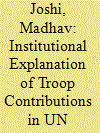

|
|
|
|
|
| Summary/Abstract |
What makes a UN member state contribute more peacekeepers to be deployed in hostile environments and place their troops at risk? A significant amount of scholarly research explores the need for, and effectiveness of, UN peacekeeping in conflict zones around the world. Few studies examine the factors that determine the size of peacekeeping contributions, and these studies do not focus on the role of neoliberal institutions. This study examines the relationship between the degree of linkages in neoliberal institutions and the size of peacekeeping contributions. I argue that the degree of linkages in neoliberal international institutions creates structural conditions that facilitate the information gathering process on the preferences and needs of UN member states and incentivize these states to contribute more peacekeeping troops. In my analysis of UN peacekeeping troop contributions data for all countries between 1990 and 2015, I find that the degree of neoliberal institutional linkages is the most consistent predictor of a UN member state’s size of peacekeeping contributions.
|
|
|
|
|
|
|
|
|
|
|
|
|
|
|
|
| 3 |
ID:
133940
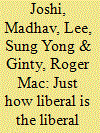

|
|
|
|
|
| Publication |
2014.
|
| Summary/Abstract |
This article assesses the extent to which the liberal peace (the dominant form of internationally supported peacemaking) actually deserves the sobriquet 'liberal peace'. In recent years, an intense debate emerged on this question as critics of the critique of the liberal peace have sought to downplay the dominance of the liberal peace. These debates are interesting but they are mainly based on qualitative analysis supplemented with some case study material, and often rely on assertions rather than evidence. This article seeks to add to this debate with simple aggregate data from the Peace Accords Matrix that is comprehensive and comparative. The article constructs a five-part framework to analyse the liberal elements of peace accords liberalism and then tracks the extent to which the elements of the framework are found in peace accords. Through this examination, it is found that the liberal peace is indeed the dominant form of peace-support intervention, although there are considerable variations in the extent and implementation of the liberalism in peacebuilding.
|
|
|
|
|
|
|
|
|
|
|
|
|
|
|
|
| 4 |
ID:
125141


|
|
|
|
|
| Publication |
2013.
|
| Summary/Abstract |
While fighting insurgency, both state and non-state groups depend on the local population for valuable resources such as food, intelligence, and security. By using a repertoire of subsistence coping mechanisms available to households in the context of the local political economy as an indicator of grievances and mechanisms of interactions between local households and the state and insurgents, district level data from Nepal on Maoist conflict is used to test hypotheses regarding state and insurgent violence. The analysis confirms that the state was more likely to kill people in a district where the number of households that borrowed to cope with subsistence was high. The Maoists were more likely to kill in a district with a higher number of subsistence sufficient households.
|
|
|
|
|
|
|
|
|
|
|
|
|
|
|
|
| 5 |
ID:
170009
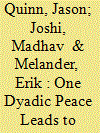

|
|
|
|
|
| Summary/Abstract |
Governments often fight multiple civil conflicts simultaneously and each conflict can have multiple groups. Prior research on civil war termination and recurrence has been conducted at either the conflict level, once all the groups have been terminated, or the dyadic level, which examines group terminations in a conflict separately as more or less independent processes. Hence, conflict-level studies mostly tell us how to preserve peace once a civil war has already ended, while dyadic studies mostly tell us about the durability of specific group-level terminations within the larger process that led to that ending. As a result, our understanding of how ongoing civil wars are brought to a close is limited, particularly, with respect to multiparty conflicts. In this study, we put forth a systems approach that treats dyadic terminations as connected processes where group terminations influence the future behavior of other groups, incentivizing the system toward greater aggregate peace or conflict. Analyzing 264 dyadic terminations, the findings suggest that the most effective strategy for governments to reduce systemic conflict is to demonstrate to other groups that they have the political will and capacity to implement security, political, and social reforms as part of a larger reform-oriented peace process. Viable implementation can be followed by the concomitant use of military victories against remaining groups with great success. However, military victories achieved in isolation, that is, outside of a reform-process, do not reduce future levels of conflict even if they themselves are durable.
|
|
|
|
|
|
|
|
|
|
|
|
|
|
|
|
| 6 |
ID:
103307


|
|
|
|
|
| Publication |
2011.
|
| Summary/Abstract |
In democratic elections, candidates and parties promise to deliver public goods to segments of the electorate to win their support at the polls. In new democracies, especially in rural agrarian societies, existing networks of clientelist politics can alter this logic, so that candidates instead promise private goods to patrons in return for those rural patrons delivering the votes of their clients. This suggests that in such regimes, the distribution of public goods spending by the government should vary inversely with the strength of clientelist networks. Specifically, we propose that the strength of patron-client ties varies according to whether peasants farm as smallholders, sharecroppers, fixed rent tenants, or landless laborers. Accordingly, the strength of rural patrons should vary across districts with the distribution of households among various land tenure categories. Our theory then suggests that where land tenure patterns render rural patrons weaker, elected governments should invest more resources in public goods to win the votes of peasants. Where land tenure patterns give patrons more control over peasant farmers, government spending on public goods should be lower because candidates and parties have to devote more resources to private benefits to the patrons. We test this proposition with district-level data from Nepal on the patterns of land tenure and on the provision of public goods.
|
|
|
|
|
|
|
|
|
|
|
|
|
|
|
|
| 7 |
ID:
136091


|
|
|
|
|
| Summary/Abstract |
This article develops a conceptual framework to explain that a rebel group, in war-to-peace transition, is likely to use violence in contested areas in order to reclaim its control over territory and populations. The decision to use violence, however, depends on whether post-accord elections are held prior to the demobilization of rebel combatants. Use of violence would still be a preferred strategy for a rebel group should the participation in elections fail to produce the expected outcome. Violence influences post-conflict elections, and when the use of violence determines an electoral outcome, parties involved in the peace process may find it difficult to reconcile their differences on peace agreement implementation. District-level data from Nepal are used to test the arguments, and the effect of post-accord violence on peace processes is evaluated in a comparative perspective.
|
|
|
|
|
|
|
|
|
|
|
|
|
|
|
|
| 8 |
ID:
150989
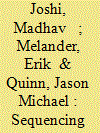

|
|
|
|
|
| Summary/Abstract |
Once a set of civil war actors reach a final peace agreement, a number of different implementation sequences are possible as the negotiated provisions are put into practice. We focus on a key but threatening stepping stone in the post-accord period—the holding of the first post-accord election—which has the capacity to be a stabilizing or destabilizing force. We identify effective accommodation provisions that civil war actors can negotiate and implement before the first post-accord election to reduce the chances of renewed violence. Utilizing new longitudinal data on the implementation of comprehensive peace agreements between 1989 and 2012 and a series of survival models, we find that if the first post-accord election is preceded by the implementation of accommodation measures, elections can have a peace-promoting effect. However, in the absence of preelection accommodation measures, elections are much more likely to be followed by peace failure
|
|
|
|
|
|
|
|
|
|
|
|
|
|
|
|
| 9 |
ID:
149065
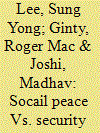

|
|
|
| 10 |
ID:
123143


|
|
|
|
|
| Publication |
2013.
|
| Summary/Abstract |
This article examines the ways in which United Nations (UN) peacekeeping missions affect democratic progress and the durability of peace in post-civil war states. After a conflict, UN peacekeeping missions provide security and create incentives for former actors to resolve their differences through peaceful and democratic means. This article contends that by providing support, peacekeeping missions help to initiate a democratic process such that former rivals can claim access to power and resources without resorting to armed conflict. To arrive at this conclusion, this article empirically examines whether UN peacekeeping missions succeeded in promoting democratic progress in postwar states and, subsequently, whether that democratic progress would contribute to the durability of peace. The indirect effect of peacekeeping on stable peace has not been explored in the literature surrounding democratic progress and the durability of peace. From the analysis of the data on post-civil war democratic progress and the durability of peace from 1946 to 2005, I find support for the alternative approach and conclude that UN missions contribute to durable peace in post-civil war states by promoting democratic political processes.
|
|
|
|
|
|
|
|
|
|
|
|
|
|
|
|
|
|
|
|
|